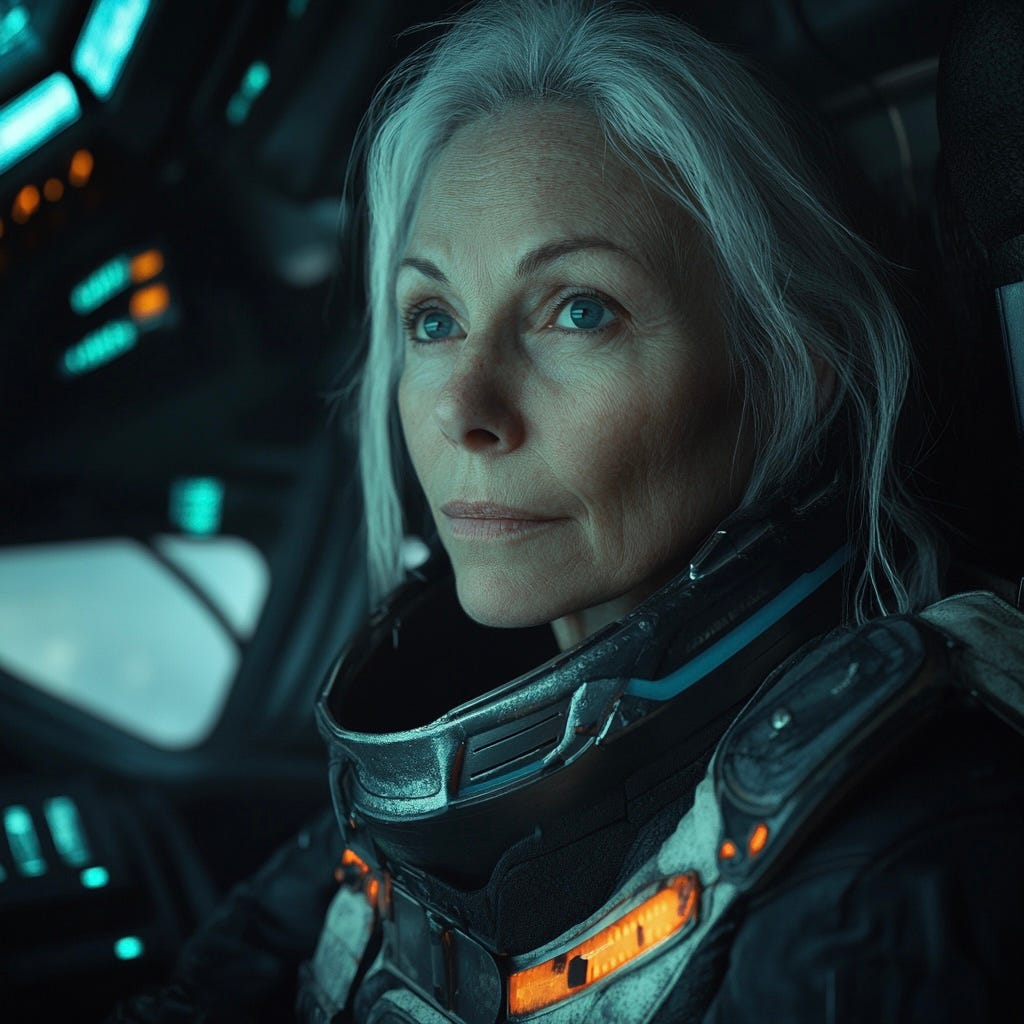Transference: Part 2
A Sci-Fi Short Story
Transference: Part 2
Part 1 | Part 2 | Part 3 | Part 4
The only organic matter inside the exoskeleton that Invar was manipulating in the Pillars of Heaven Nebula, was a highly condensed neural core into which his consciousness had been inserted. This surrogate ‘brain’ was not located in the suit’s head but in its chest, the most insulated and reinforced part of it. His real body was sealed in a control coffin beneath the mining station on that dark exoplanet over 500 lightyears away. The nerves and glial cells of his physical brain were the only parts of him that had not been cooled to a temperature only slightly above absolute zero.
Compared to the coziness and intimacy of a Synthesis Chamber, where the pliant and receptive organic tissue remained in a constant state of zoomorphic flux so as to conform to the physical actions of the individuals whose thoughts were being embodied in them, this type of ‘transference’ (as the process was called) was much more scaled down due to its inefficiency and comparative instability. The IQMR acted as a sort of puppet master, secreted away in the quantum manifold (that inter-dimensional medium that was invisible to the human eye).
Invar’s son, Bainyum, walked beside his father down the corridor leading to the hangar where the cruiser that was to take them to the Great Storm was being readied. The IQMR did not project faces on the Transference Suits’ mirrored visors, since the probability of producing a holographic countenance whose expressions were wildly at odds with what the mind in machina was thinking was too high. So when the young man glanced up, he saw nothing in the silvery visage but his own reflection foregrounded against the white and amaranthine clouds scudding past the windows.
“Father, there’s something I must tell you before we arrive at the hangar.”
“Yes?”
“You will be meeting my wife for the first time.”
“I thought that your interests ran to men.”
“They did. Perhaps they still do. But since we humans are numb to the workings of Eros and the alleged delights of physical conjugation, I can only presume that the satisfaction I feel in her company is qualitatively similar to that sentiment the ancients referred to as love.”
“Then I am happy for you. Have you propagated?”
“Our children are being incubated.”
“Here in the nebula?”
“Yes.”
“Twins?”
“Yes, but not monozygotic ones. We are staggering the births a month apart. And we may have a third. The first will be born in seven years, perhaps earlier. We haven’t decided.”
Xiriyala kept a respectful distance behind Invar and Bainyum. She was still upset by her son’s imputation that she was to blame for his being born with her in the nebula instead of with Invar. Human embryos no longer developed in utero, and the period of gestation could be drawn out for decades. There was no reason why her genetic information could not have been transmitted to the mining station and encoded in an ovum there. But neither she nor Invar had thought much of the matter at the time.
When the three of them reached the hangar, they found the cruiser waiting for them. Although the IQMR would be piloting the vessel to their destination, Bainyum had constructed a small shuttle with his own hands which had been moved into the larger ship’s hull.
A beautiful young woman approached from the opposite end of the room. She crossed a narrow (unrailed) footpath that connected the inside of the hangar to the external landing pads where the smaller transports that conveyed people to and from the other satellites and residential palaces were located. She could not have slipped or fallen, since the IQMR’s gravitational force-field would have caught her and placed her back on the ledge in a standing position.
Though the air of the nebula was breathable (and a separate force field regulated the atmospheric pressure), the winds were quite brisk. But since humans had been genetically modified to be insensible to the subjective discomforts occasioned by negligible differences in ambient temperatures, the woman was not wearing a thermal suit, nor did she seem annoyed by the gusty drafts that ruffled her chestnut hair.
She extended her hand to shake Invar’s metallic one. “Hello, I’m—”
“My son’s wife,” he interrupted. “I know.”
“Do you know my name?” she asked.
“I have not been informed.”
“Tyarna. My father is head of the Science Council.”
“There are thousands of Science Councils. I presume he runs the one here, on Platform 44G8-X-HLP99-2?”
“Yes,” she said.
“Then you are the daughter of Pen-Holder Lisskon. I know him well. A brilliant man.”
She tilted her head. “Have I offended you, Sir?”
“Of course not,” Invar said. “You stated your facts; I stated mine. Welcome to our family.”
To hide his embarrassment, Bainyum walked to the ship. When he had reached the entrance, he gestured for his parents and spouse to join him.
Moments later the four of them were racing through the parting clouds toward the storm. Since the cruiser was being guided by the IQMR, there was nothing for them to do but pace around the ample observatory, located at the top of the ship beneath a transparent trapezium-paneled dome.
If any of them had wanted to sit down, a chair would have risen out of the carpet to receive them. But none did. Invar commented on how ridiculous it would have looked for a mechanical suit to contort itself into a sedentary position so as to “rest its aching feet.” This elicited a halfhearted laugh from Tyarna, which spurred Invar to turn away, apparently annoyed that she had found the remark amusing.
He addressed his son. “You realize that your mother and consort will almost certainly die in the storm.”
“How so?” Bainyum asked.
“The Internal Quantum Manifold Regulator is fused to every cell of your body. You claim the network told you ‘in your dreams’ that it would withdraw its influence before you entered the Great Storm. Even if this were possible, which I doubt it is, it does not imply that the network would extend the same courtesy to Xiriyala or your wife.”
Xiriyala suppressed an ambiguous smile. Humans were no longer capable of willing themselves to die. But they could will themselves no longer to live; and this was the reason she had agreed to join her son on the journey.
“Father, the IQMR spoke to me over the course of many days and through many dreams. It did not speak in words; but in images and metaphors. The burden of its message was that it would withdraw its influence from anyone who accompanied me into the storm.”
“You have strayed into the thickets of oneirocriticism: dream interpretation, a disgraced and irrational discipline.”
“We have entered the Weeping Gardens,” Tyarna said, changing the subject.
The gardens extended thousands of miles in every direction. The uprooted mountains in it were the remains of a solar system whose planets had suffered a cataclysmic event that hurled its fragments into the nebula. But the countervailing winds had brought the tumbling rocks to a state of uncertain but relative poise. The tumbling masses drifted glacially about, sometimes taking centuries—even when less than a mile apart—to collide with one another. Others simply cracked or tore asunder due to internal stresses or through the unseen workings of the IQMR.
The network had utilized the naturally occurring minerals in the asteroids to create enriched soils that acted as Petri dishes. Bacteria and numberless unicellular organisms were introduced into them. The evolution of these were artificially accelerated until complex lifeforms, such as insects, lizards, marsupials, and birds were brought forth. The ecosystem was entirely engineered.
Interspersed between the mist-veiled asteroids were thousands of saucer-shaped satellites, some of which were inhabited by humans and all of which helped to regulate the moisture and the diffusion of synthetic agents and nutrients that kept the jungle vibrant and healthy. A profusion of vines, branches and implicate roots hung beneath the saucers’ undercarriages or clung to the smooth stainless-steel tops. Some of the foliage formed bridges between the asteroids, which the animals crossed until the bridges were severed, stranding them and forcing them to adapt or become extinct.
It was impossible for precipitation or an obfuscating fog to occlude the dome’s transparent surface, so the grandeur of the spectacle remained undiminished. But the humans were more concerned with the drama going on inside the observatory than what was happening outside of it.
“I spend much of my time in the Weeping Gardens,” Tyarna commented. “I am a botanist.”
“We are all scientists,” Invar said. “For a decade I kept a greenhouse on the mining station where I live. Does that make me a botanist?”
“Father. . .” Bainyum said, crossing the room and taking Tyarna’s hands into his. “We are all specialists of a kind. I consider myself an engineer. Mother is an astrophysicist. What is your specialty?”
“Psychology,” he said.
Bainyum nodded. “Then as a ‘psychologist’, perhaps you would care to explain to me why it is you have been behaving so rudely toward my wife?”
There was a prolonged silence before Invar replied. “I have been acting this way because I resent her. On learning that you were married, I concluded that it was she who persuaded you to undertake this foolish journey. And since I knew that (for whatever reason) you wanted me to come with you, I decided to use this fact as leverage in my effort to drive a wedge between the two of you. This is due to the fact that I care more for your mother than I do for you—or for her.” He flicked his wrist in Tyarna’s direction.
Bainyum frowned, dismayed. His voice grew tense. “How did you make that assessment? I will tell you how. There was a delay before you replied, because you were mentally consulting with the IQMR. It was the network that fed you that response.”
Invar turned to face Xiriyala, but his wife was sedulously ignoring them all.
“Father,” Bainyum said. “Tyarna has made a discovery. Tell him, my dear.”
The young woman nodded and folded her arms across her chest. “In addition to the alien flora and fauna, there are many animals and plants in the garden that are from Earth.”
“Child,” Xiriyala muttered abstractedly. “That is a well known fact.”
“Yes,” the young woman persisted. “But the Terran lifeforms in the ecosystem are less than twenty thousand years old. This would coincide with the time we humans are believed to have come to the Pillars of Heaven Nebula. Yet the alien lifeforms here predate that by millions of years. And the saucer-shaped satellites drifting among the asteroids are even older.”
“I am at a loss as to why this matters,” Invar said, as his mechanical body strode across the room to join Xiriyala.
“Father, as a ‘psychologist’ do you not find it strange that, despite humanity’s alleged predisposition to intellectual curiosity, we are on the whole incapable of showing any interest in our origins?”
“One might as well count the contents of an empty jar,” Invar said. “Like God, our past no longer exists.”
Bainyum shook his head. “But the ancients had a deep respect for history, for art, for literature.”
“We still read the ancients,” Xiriyala said. “We use their works as rhetorical models. They are sources of reference for the recreational puzzles and intellectual conundra that we set ourselves to solve. Our forebears’ histories and religious scriptures are an endless fund of data, even if these data are pointless.”
“Everything we need,” Invar added, “is here in the nebula. Our society is impervious to political or social change. History as a tool for predicting primitive human trends has no meaning here. We no longer have a future to look forward to; and we are not burdened by the ancients’ nostalgia for the past.”
“Father, we have been told that humanity nearly destroyed itself. But there are no records explaining what exactly happened. It is said that humanity had the ability to travel faster than light, but there is no information as to how this was accomplished, or how we lost this knowledge. We do not even know who created the IQMR, which controls every aspect of our lives.”
Xiriyala spoke again: “Recall Shelley’s line: We look before and after, and pine for what is not. The only thing that matters, Bainyum, is the present.”
The young man went to his mother. “Then what is the purpose of our being here?”
“There was never a purpose,” Xiriyala said, refusing to look at him as she studied a kaleidoscope of iridescent butterflies fluttering between the asteroids.
It took them half a day to reach the Great Storm’s outflow boundary. The rosy-hued surroundings gave way to banks of cloud the color of bruised flesh, from the depths of which flashed the indigo bolts of the hastro-electric storm.
“You will have to remain here, Father.” Bainyum said.
“I know,” Invar replied. “We established that before the trip began.”
The young man looked askance at the floor. “You will never understand how much it meant to me that you agreed to come.”
“Though I expressed to you that I care more for your mother, that does not mean that I do not care for you. . . Are you crying?”
“I can’t help it,” the young man said, looking up into the mirror face and seeing only his own despair.
Invar embraced his son. “I shall remain here and do what I can to monitor your progress. But if I suspect that you have perished, I will leave.”
An elevator rose up out of the carpet. Bainyum, Xiriyala and Tyarna stepped into it. Soon they were in the shuttle bay far beneath the observatory. Steam rolled out from under the primitive ship before them. All three removed their clothing and donned the spacesuits that Bainyum had designed for them. Then they ascended the gangway into the ship.
It was not a large vessel, but it contained six broad compartments on either side of the narrow corridor that ran the length of it. The ceiling was surprisingly high. They went to the cockpit and Bainyum settled himself before the command console. He activated the power, and began running a series of diagnostic checks. Xiriyala and Tyarna strapped themselves into the jump-seats behind him. He turned around to address them.
“When we enter the storm, we will lose gravity. The atmospheric pressure will feel different. The human mind is too limited to replicate the gravitational and atmospheric fields the IQMR employs. There is no breathable air in the storm. It is poisonous. But there is enough oxygen on the ship and in our suits to last for days. But I do not anticipate our being in the storm for more than a few hours. I will try to communicate with Father once we are in the eye. Are you ready?”
“I feel exhilarated,” Tyarna replied.
“Mother, what about you? Are you ready?”
Xiriyala regarded him with a withering gaze. “Of course,” she said. She was convinced that they were soon to die.











I accidentally quoted the wrong Romantic poet in the first draft. “We look before and after and pine for what is not” was a line from Shelley instead of Byron. 🤦♂️